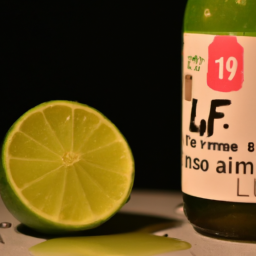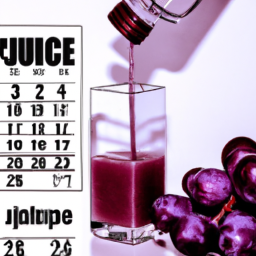As someone who uses lime juice often in both cooking and mixed drinks, I have often wondered about its shelf life once opened. Just like many other perishable items, lime juice can deteriorate over time, impacting both its flavor and nutritional value.
The length of time that lime juice lasts after opening depends on various factors, including how it was prepared, how it is stored, and whether it was pasteurized or not.
In this article, I will explore the different factors that affect the shelf life of lime juice after opening and provide tips on how to extend its freshness. Whether you prefer freshly squeezed lime juice or bottled lime juice, it is important to know how long you can safely use it in your recipes.
I will also share some ideas for using up any leftover lime juice that may be close to spoiling and offer suggestions on how to dispose of it safely. So, let’s dive in and learn more about how long lime juice lasts after opening.
Key Takeaways
- Freshly squeezed lime juice can last up to a week in the refrigerator, while bottled lime juice can last up to 2 years due to pasteurization.
- Proper storage, such as using airtight containers and avoiding direct sunlight and heat, can extend the shelf life of lime juice by several days or weeks.
- Signs of spoilage include foul odor, cloudy appearance, mold growth, and off taste, which can cause food poisoning and other health risks if consumed.
- Adding preservatives like citric acid or sodium benzoate can inhibit bacterial growth and extend shelf life, but the effectiveness of preservatives depends on various factors.
Factors Affecting Lime Juice Shelf Life
The shelf life of lime juice can be affected by various factors, such as exposure to air and light, temperature, and the presence of preservatives.
When it comes to lime juice storage tips, it’s important to keep the container tightly sealed to prevent air from getting in. Oxygen can degrade the quality of the juice, leading to a shorter shelf life.
Additionally, exposure to light can cause the juice to spoil faster, so it’s best to store it in a cool, dark place.
Preservatives can also play a role in lime juice preservation methods. Some commercially available lime juices may contain preservatives such as sodium benzoate or potassium sorbate, which can help extend their shelf life.
However, if you’re looking for a more natural option, you can try squeezing your own lime juice at home. Freshly squeezed lime juice can last for up to a week when stored in the refrigerator in an airtight container.
Freshly Squeezed Lime Juice
When I make freshly squeezed lime juice, I know that its shelf life won’t be as long as store-bought options. However, I find the taste to be worth the shorter lifespan.
It’s important to keep an eye out for signs of spoilage, such as a sour smell or taste, to ensure that the juice is still safe to consume.
Shelf Life
Once you crack open that bottle of lime juice, its shelf life begins to tick away. Lime juice contains citric acid which acts as a natural preservative, but exposure to air can lead to bacteria growth and spoilage. Despite decreased nutritional benefits, lime juice can still be safely consumed past its expiration date. However, the flavor and quality may deteriorate over time.
To ensure freshness, store lime juice in an airtight container in the refrigerator and consume within a week of opening. Keep an eye out for signs of spoilage, such as a sour smell or taste, cloudy appearance, or mold growth.
In the next section, we will discuss these signs of spoilage in more detail.
Signs of Spoilage
You may be able to tell if your lime juice has spoiled by looking for certain indicators of bacterial growth. Detecting spoilage is important because consuming spoiled lime juice can pose health risks.
Here are some signs to look out for to determine if your lime juice has gone bad:
- Foul odor: If your lime juice smells bad or rancid, it’s most likely gone bad.
- Cloudy appearance: Lime juice should be clear. If it appears cloudy or has sediment, it may be spoiled.
- Mold growth: If you notice any mold growth in your lime juice, it’s best to dispose of it immediately.
- Off taste: Spoiled lime juice may have a sour or bitter taste, indicating the presence of harmful bacteria.
It’s important to note that consuming spoiled lime juice can lead to food poisoning and other health risks. If you’re unsure about the freshness of your lime juice, it’s best to err on the side of caution and dispose of it.
When it comes to bottled lime juice, the same rules apply. It’s important to check the expiration date and look for any signs of spoilage before consuming.
Bottled Lime Juice
Bottled lime juice is so long-lasting that you’ll probably forget when you first opened it! Unlike fresh lime juice, which can only last for a maximum of 5 days in the refrigerator, bottled lime juice has a shelf life of up to 2 years. This is because bottled lime juice is pasteurized, which means it has been heated to a high temperature to kill off any harmful bacteria that could cause spoilage.
Uses for bottled lime juice in cooking are numerous. It can be used to add a tangy flavor to marinades, salad dressings, and sauces. The benefits of using bottled lime juice over fresh lime juice are that it’s convenient, cost-effective, and has a consistent flavor. Additionally, bottled lime juice is a great alternative for those who can’t find fresh limes in their local grocery stores.
With all these benefits, it’s no wonder why bottled lime juice is a staple in most households. Moving forward, let’s talk about how to store lime juice properly to ensure it stays fresh for longer.
Storing Lime Juice
When it comes to storing lime juice, I prefer to keep it in the fridge to maintain its freshness and quality. However, if you plan to use it within a day or two, leaving it at room temperature is also an option.
To ensure proper storage, always use a clean and airtight container, and avoid exposing it to direct sunlight or heat.
Fridge vs. Room Temperature
Storing lime juice in the fridge will help it last longer than leaving it at room temperature. This is because refrigeration slows down the growth of bacteria and other microorganisms that can cause spoilage. Additionally, lower temperatures can help preserve the flavor and nutrients of the juice.
Here are some key factors to consider when deciding between room temperature and refrigeration for lime juice storage:
-
Room temperature storage may be convenient, but it can cause the juice to spoil faster, especially in warm environments.
-
Refrigeration can help extend the shelf life of lime juice by several days or even weeks, depending on the type of container and how well it is sealed.
-
However, refrigeration can also affect the texture and taste of the juice, especially if it’s stored for too long or exposed to air.
So, if you want to keep your lime juice fresh and flavorful for as long as possible, it’s best to store it in the fridge. But, you should still be mindful of the container and how well it’s sealed.
In the next section, we’ll discuss some tips for proper storage to help you get the most out of your lime juice.
Tips for Proper Storage
To keep your lime juice fresh, you should always refrigerate it in an airtight container, as studies have shown that open containers can cause a significant loss of vitamin C in just 24 hours. It is also important to use the best containers for storage. Glass containers with airtight lids are the best option because they do not react with the acids in the lime juice. Avoid plastic containers because they can leach chemicals into the juice and alter its taste and quality.
Another crucial factor in proper storage is avoiding cross-contamination. Lime juice should always be stored separately from other foods, especially those with strong odors. This will prevent the juice from absorbing any unwanted flavors and odors. By following these tips for proper storage, you can ensure that your lime juice retains its freshness and quality for as long as possible. In the next section, we will explore ways to extend the shelf life of lime juice even further.
Extending Lime Juice Shelf Life
As someone who frequently uses lime juice in cooking and drinks, I’ve experimented with ways to extend its shelf life.
Freezing lime juice in an ice cube tray is a great method for preserving its freshness and flavor for up to six months.
Another option is to add preservatives such as citric acid or sodium benzoate to the juice. This can increase its shelf life by inhibiting bacterial growth.
Remember to always follow safe food handling practices and refrigerate any unused juice promptly to ensure its longevity.
Freezing Lime Juice
You’ll be thrilled to know that freezing lime juice is a fantastic way to extend its shelf life! This is especially useful for those who frequently use lime juice in their recipes or cocktails.
Here are some helpful tips to ensure that your frozen lime juice stays fresh and ready to use:
- Use an airtight container to prevent freezer burn and to maintain the lime juice’s flavor.
- Leave some space at the top of the container to allow for expansion during freezing.
- Label the container with the date it was frozen to keep track of its freshness.
- Thaw the frozen lime juice in the refrigerator and use it within a few days of thawing.
By following these simple steps, you can enjoy the benefits of using fresh lime juice in your recipes and cocktails for a longer period of time.
However, if freezing is not your preferred method, there are other ways to extend the shelf life of lime juice, such as adding preservatives.
Adding Preservatives
If you’re looking to keep your lime juice fresh for a while, try adding preservatives like citric acid. By doing so, you can extend its shelf life without sacrificing flavor. There are different types of preservatives that are commonly used, such as ascorbic acid and sodium benzoate. These preservatives work by inhibiting the growth of bacteria and other harmful microorganisms that can cause spoilage.
However, it is important to note that the effectiveness of preservatives depends on various factors such as the type and concentration of the preservative, storage conditions, and the length of time the juice has been opened. It is also recommended to follow the manufacturer’s instructions when using preservatives. With the addition of preservatives, you can enjoy your lime juice for a longer period of time without worrying about spoilage. As we move on to the next section, we’ll take a look at what you can do with lime juice that has already gone bad.
Using Spoiled Lime Juice
Using spoiled lime juice can result in an unpleasant taste in your dish. It’s not recommended to cook with lime juice that has gone bad, as it can also pose health risks.
Spoiled lime juice can contain harmful bacteria that can cause food poisoning and other illnesses. If you accidentally use spoiled lime juice in a recipe, it’s best to discard the dish and start over with fresh ingredients.
To avoid using spoiled lime juice, be sure to check the expiration date before opening the bottle. Once opened, lime juice can last for up to six months if stored properly in the refrigerator.
When it comes to using lime juice in recipes, there are many delicious options to choose from. From marinades and dressings to cocktails and desserts, lime juice adds a bright and tangy flavor to any dish.
Recipes for Using Lime Juice
Like the iconic cocktail, lime juice can also add a refreshing twist to savory dishes such as seafood ceviche or tangy chicken tacos. One of my favorite ways to use lime juice is as a marinade for chicken or fish. The acidity in the juice helps to tenderize the meat while adding a bright, citrus flavor.
Simply mix lime juice with other ingredients like garlic, cilantro, and olive oil to create a flavorful marinade that will infuse your protein with deliciousness. Another way to incorporate lime juice into your cooking is by making a lime vinaigrette. This versatile dressing can be used on salads, roasted vegetables, or even as a dip for grilled meats.
To make a basic lime vinaigrette, whisk together lime juice, olive oil, honey, and Dijon mustard until emulsified. From there, you can add additional ingredients like herbs or spices to customize the flavor to your liking. With these simple recipes, you can elevate your cooking with the zesty tang of lime juice.
As for alternative uses for lime juice, there are plenty of creative ways to incorporate this citrusy ingredient into your daily life.
Alternative Uses for Lime Juice
Get ready to discover some surprising ways to incorporate the zesty flavor of lime into your daily routine. Lime juice is not only a great addition to cocktails and recipes, but it also has several benefits and varieties that make it a versatile ingredient for everyday use.
One of the benefits of lime juice is that it can be used as a natural cleaner. Its acidity helps remove stains and grime from surfaces, making it a great alternative to harsh chemicals. Lime juice can also be used as an air freshener by adding a few drops to a spray bottle filled with water. Its fresh and invigorating scent can help eliminate odors and create a refreshing atmosphere. Additionally, lime juice can be used as a natural insect repellent, as its strong scent deters bugs from entering your home.
With so many benefits, lime juice is a must-have household item.
When it comes to disposing of spoiled lime juice, it’s important to do so properly to avoid any potential health hazards. One way to dispose of it is by pouring it down the drain with plenty of water to dilute it. However, if you have a septic tank, it’s best to avoid pouring lime juice down the drain altogether, as it can disrupt the natural balance of bacteria in the tank. Instead, consider composting the spoiled lime juice or disposing of it in a biodegradable bag.
By taking these simple steps, you can ensure that your lime juice is properly disposed of and that your home and environment remain safe and healthy.
Disposing of Spoiled Lime Juice
When it comes to disposing of spoiled lime juice, there are proper methods that must be followed to prevent environmental harm.
As someone who cares about protecting the environment, I always make sure to dispose of spoiled lime juice properly.
This involves pouring the juice down the drain with plenty of running water to dilute it and then properly disposing of the container in the appropriate recycling or trash bin.
Proper Disposal Methods
Don’t just throw away your leftover lime juice after it has expired; instead, take a moment to properly dispose of it to ensure the safety of yourself and the environment.
There are eco-friendly alternatives to simply tossing it in the trash. One option is to use it as a composting ingredient. Lime juice is acidic, which can help balance the pH levels in compost and aid in the breakdown of organic matter. However, it’s important to note that lime juice should be added in moderation and not used as the sole composting component.
If composting isn’t an option for you, another way to dispose of expired lime juice is by pouring it down the drain with running water. This will help dilute the acidity of the juice and prevent damage to your pipes. It’s important to avoid pouring it in large quantities or dumping it all at once to prevent clogging.
Remember, proper disposal of expired lime juice not only helps to maintain a healthy environment but also prevents harm to yourself and others.
In the subsequent section, we will discuss the environmental impact of improperly disposing of lime juice.
Environmental Impact
The improper disposal of expired lime juice can have a devastating impact on the environment, causing harm to ecosystems and wildlife. Here are some of the reasons why:
-
When lime juice is dumped in the landfill, it produces methane gas, which contributes to global warming and climate change. This is because organic waste, such as lime juice, decomposes in the absence of oxygen, releasing methane gas into the atmosphere.
-
Lime juice contains citric acid, which can lower the pH of soil and water, making it more acidic. This can harm aquatic life and vegetation, as well as impact the quality of soil for farming and other agricultural activities.
-
Discarded lime juice can also attract pests such as rodents, flies, and cockroaches, which can spread diseases and cause health hazards.
-
Improperly disposed of lime juice can also contaminate water sources, which can have severe consequences on human health.
Therefore, it’s crucial to practice environmental sustainability by disposing of lime juice properly. One way to do this is by composting it, which helps reduce its carbon footprint and provides a natural fertilizer for plants.
Another way is to recycle the packaging material, such as plastic bottles or glass jars, to reduce waste and promote a circular economy. By taking these small steps, we can help protect our environment and preserve it for future generations.
Frequently Asked Questions
Can I freeze lime juice to extend its shelf life?
Did you know that freezing lime juice can extend its shelf life up to 6 months? When thawing, allow enough time for the juice to fully defrost before using. This method is a great way to preserve lime juice for later use.
How long does lime juice last if it’s not stored in the refrigerator?
Lime juice stored at room temperature has a higher risk of spoilage compared to refrigerated ones. The duration of its freshness varies depending on factors such as the quality of the juice, storage conditions, and exposure to air.
Is there a difference in shelf life between bottled and fresh lime juice?
There is a difference in shelf life between bottled and fresh lime juice. While bottled lime juice can last longer due to added preservatives, fresh lime juice has higher nutritional value.
Can I use lime juice that has been expired for a few days?
Using expired lime juice is risky. To tell if it has gone bad, check for a change in color, odor, or taste. As a rule, discard any expired lime juice to avoid potential foodborne illness.
Are there any health risks associated with consuming spoiled lime juice?
Consuming spoiled lime juice can pose food safety risks due to bacterial growth. Symptoms may include nausea, vomiting, and diarrhea. It is important to check expiration dates and properly store opened lime juice to prevent spoilage.
Conclusion
Well folks, there you have it – the definitive guide on how long lime juice lasts after opening.
Remember, the shelf life of lime juice depends on a variety of factors such as whether it’s freshly squeezed or bottled, and how it’s stored.
If you want to extend the shelf life of your lime juice, consider adding preservatives or freezing it. And if you do happen to come across spoiled lime juice, don’t throw it away just yet.
There are plenty of recipes and alternative uses for it, such as adding it to marinades or using it as a natural cleaning agent.
So go ahead and stock up on those limes – but remember to use them up before they go bad. After all, as the old saying goes, "waste not, want not!"









